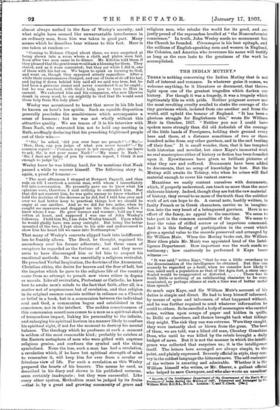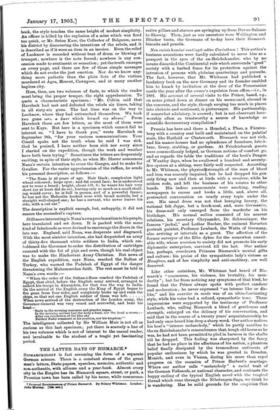THE INDIAN MUTINY.* THEWS is nothing concerning the Indian Mutiny
that is not full of interest and romance. In whatever guise it comes, we welcome anything, be it literature or document, that throws light upon one of the greatest tragedies which darken our history. For though it was a tragedy, it was a tragedy which legitimately fills us with pride. Neither poignant sorrow nor-
the most revolting cruelty availed to shake the courage of the tiny garrisons which, isolated from one another and from the world, still upheld the honour of England. "It has been a glorious struggle for Englishmen this," wrote Sir William
Muir in October, 1857. "Neither you nor I could have spoken more strongly than did old .Asdoolah of the courage of the little bands of Foreigners, holding their ground every here and there, at a distance sometimes of two or three- hundred miles from any other garrison, and in the end beating off their foes." It is small wonder, then, that it has tempted both historian and novelist, but since ICaye's immortal work no real masterpiece either of history or fiction has been founded upon it. Eyewitnesses have given us brilliant pictures of what they saw and suffered. Documents have been added to documents, that no scrap of knowledge be lost. But the Mutiny still awaits its Tolstoy, who when he arises will find material enough to cover his vastest canvas.
Meantime we easily content ourselves with documents, which, if properly understood, can teach us more than the most elaborate history. Indeed, though they are but the raw material of history, they reveal to us more of the truth than the subtlest work of art can hope to do. A casual note, hastily written, in faulty French or in Greek characters, carries us in imagina- tion into the very heart of a beleaguered garrison. Here is no effort of the fancy, no appeal to the emotions. We seem to take part in the common casualties of the day. We seem to hear the voice of stifled sorrow or of imperious command. And it is this feeling of participation in the event which gives a special value to the records preserved and arranged by Sir William Muir. When the Mutiny broke out, Sir William Muir (then plain Mr. Muir) was appointed head of the Intel- ligence Department. How important was the work needs no testimony ; how cautiously he performed it Kaye bears witness :—
" It was said," writes Kaye, "that he was a little overchary in the dissemination of the intelligence he obtained. But this can scarcely be regarded as a fault, when we consider how likely it was, amid such a population as that of the Agra fort, a story once
floated would be exaggerated or distorted There was in truth little or nothing of an exhilarating character to be com- municated, so perhaps silence at such a time was of better metal than speech."
So much says Kaye, and Sir William Muir's account of his duties is simple and direct. He had to keep himself informed, by means of spies and informers, of what happened without, and he was further required to send whatever information he could to others. So he enrolled a body of messengers who carried notes, written upon scraps of paper and hidden in quills, to Delhi or elsewhere, and thence brought back what tidings they might. The risk they ran was extreme. Were they caught, they were instantly shot or blown from the guns. The best of them, we are told, was a blind old man, Choubey Gunsham Doss, who until he was killed by the rebels brought a daily budget of news. But it is not the manner in which the intelli- gence was collected that surprises us ; it is the intelligence itself. The letters here arranged are always simple, to the point, and plainly expressed. Severely official in style, they con- vey in the coldest language the bitterest news. The self-restraint of the writers is amazing and admirable. Whether it is Sir William himself who writes, or Mr. Sherer, a gallant official who helped to save Cawnpore, and who also wrote an excellent
• BAcords of the intelligence Department of the Oosentment of the Forth-West Provinces of India during the Muting of 1867. Preserved and Arranged by Sir William Muir, N.C.S.L, D.C.L London: T. and Clark. [36s.]
book, the style touches the same height of modest simplicity. An officer is killed by the explosion of a mine which was fired too quick, or Mr. Seton Karr, the Collector of Belgaum, saves his district by discovering the intentions of the rebels, and it is described self it were an item in an invoice. Even the relief of Lucknow is recorded without beat of drum or blowing of trumpet; nowhere is the note forced; nowhere is any con- cession made to sentiment or sensation ; yet the truth emerges on every page, and there are few of these simple messages which do not evoke the just emotion. Nor do we know any- thing more pathetic than the plain lists of the victims murdered at .Agra, Meerut, Cawnpore, and at many another hapless city.
Here, then, are two volumes of facts, to which the reader must bring the proper temper, the right apprehension. To quote a characteristic specimen : "Mr. Colvin said that Havelock had met and defeated the rebels six times, taking
in all sixty-six guns. The last time was on the way to Lucknow, where they had entrenched themselves. We took two guns war, a OCCZT which laaria sup avarc." From
Havelock there are few letters, as the most of them were pent to Kaye. But here is a specimen which cannot fail to interest us. "I have to thank you," wrote Havelock on September 9th, "for your various communications. Your Cossid spake not the truth when he said I was sick. God be praised, I have neither been sick nor sorry since I started on the expedition, though the work and weather have both been trying." Sometimes the letters are desperately exciting, in spite of their style, as when Mr. Sherer announces Nana's certain intention to cross the Ganges, and to make for Gwalior. For the easier apprehension of the ruffian, he sends his personal description, as follows :—
"The Nana is 42 years of age. Hair black; complexion light wheat coloured; large eyes; and fat round face; he is understood not to wear a beard; height, about oft. 8; he wears his hair very short (or at least did do so), leaving only so much as a small skull- cap would cover; he is full in person, and of a powerful frame; he has not the Mahratta hooked nose with broad nostrils, but a straight well-shaped one; he has a servant, who never leaves his side, with a cut ear."
The description is explicit enough, but, unhappily, it did not ensure the scoundrel's capture.
Still more interesting is Nana's own proclamation to his people, here translated and set down. It is packed with the same kind of falsehoods as were devised to encourage the Boers in the late war. England, said Nana, was desperate and disgraced.
With the most sinister intention, she had despatched an army of thirty-five thousand white soldiers to India, which em- boldened the Governor to order the distribution of cartridges
smeared with the fat of pigs and cows, though his real object was to make the Hindostani Army Christian. But news of the English expedition, says Nana, reached the Sultan of Turkey, who warned the Padshah of Egypt of the danger threatening the Mahommedan faith. The rest must be told in
Nana's own words :—
"When the order of the Sultan-i-Rum reached the Padshah of Egypt, that chief, before the English army arrived, arranged to
collect his troops in Alexandria, for that was the way to India On the arrival of the English army the King of Egypt began to fire guns from four sides, and completely broke up and sunk the
ships, so that not one English soldier of them was left When news arrived of the destruction of the London army, the Governor-General was very vexed and sorrowful, and bent his heed—
'Early in the morning massacre and plunder began, In the morning neither bad the body a head, nor the head a crown ;— After one revolution of the blue sky Neither Nadir remained in his position, nor his kingdom.' "
The intelligence collected by Sir William Muir is not all as curious as this last specimen; yet there is scarcely a line of his two volumes which is not of interest to the casual reader, and invaluable to the student of a tragic yet fascinating period.











































 Previous page
Previous page